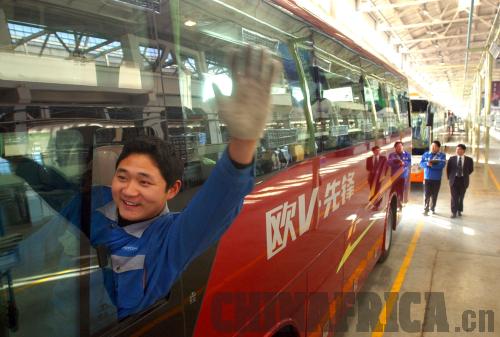|
 |
|
CLEAN DRIVING: Guangzhou Yiqi Bus Company takes delivery of 30 Foton hybrid buses (XINHUA) |
Poor air quality is one of the most negative factors of a modern world. A large contributing factor to the foul air people breathe is the emissions from millions of vehicles that are part of everyday life. China became the world's largest automobile market in 2009, and vehicles thus became the country's top air polluters.
To alleviate traffic gridlock, bus numbers are on the rise and by September 2010, a total of 40,830 autobuses were operating in the country's capital, according to Beijing Public Transport Holdings, Ltd. (BPT), which manages the city's public transportation system. In February 2010, BPT purchased 300 new-energy buses from Foton Motor Group, adding to the original 970 already running in the city.
The Beijing-based Foton was established in 1996, rising to prominence rapidly through its research and development. In 2009, it exceeded Daimler-Benz to become the world's largest commercial vehicle manufacturer, with a sales volume reaching 600,000.
It is in the area of new-energy vehicle development that Foton has attracted the most attention. With environmental protection and pollution reduction under a global spotlight, in 2003, with an investment of 600 million yuan ($91.14 million), Foton built the first national laboratory for the research of new-energy vehicles. Since this milestone the company has progressed in leaps and bounds.
New-energy vehicles are powered by energy sources other than gasoline and diesel. That source can be battery, hybrid powered (a combination use of fuel and electricity) or solar-powered. Foton's first hybrid-power passenger vehicle came into public use in 2006.
To promote the new product, Foton teamed up with Guangzhou Yiqi Bus Co., one of the three leading public transportation companies in China, and handed over the use of one of their new buses free of charge for half a year.
At the end of that period, to the surprise of Guangzhou Yiqi, Foton's hybrid bus consumed 29.3 liters per 100 km, compared to 42-45 liters per 100 km for a conventionally powered bus.
Guangzhou Yiqi reported on its website that the new bus saved over 30 percent in fuel and helped the company reduce 20 percent of its operation costs for a single bus. As a result, Guangzhou Yiqi ordered 30 new-energy buses from Foton, initiating China's first commercial deal on new-energy vehicles.
Test results from the China Association of Quality Inspection indicate that compared with diesel-powered buses, Foton's hybrid bus saves 37 percent in fuel and emits 37 percent less air pollutants. It also accelerates the time taken to get from 0 to 50 km per hour in 22.5 seconds, 20 percent shorter than an ordinary bus. And it is less noisy, offering a comfortable environment for passengers.
In December 2008, BPT purchased 800 hybrid buses from Foton, the largest commercial deal for new-energy buses in the country at that time. At the end of 2009, 50 BEVs (Battery Electric Vehicle) were delivered to BPT. In July 2010, the Beijing Municipal Government, in a gesture of goodwill, donated two Foton hybrid buses to Moscow, highlighting the government's confidence in the quality of the company's product. Orders increased rapidly and more than 1,500 Foton hybrid buses had been running in different Chinese cities like Beijing, Jinan, Guangzhou and Taipei by August 2010, according to a report in Beijing Business Today.
|